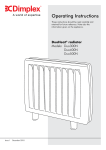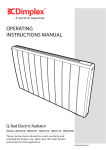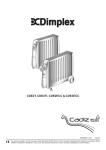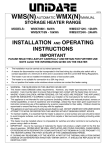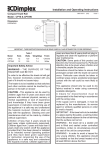Download Operating Instructions
Transcript
Operating Instructions These instructions should be read carefully and retained for future reference. Note also the information given on the appliance. CXLSN automatic storage and convector heater range Models: CXLS12N CXLS18N CXLS24N Issue 1 January 2011 1224-CXLSN_STORAGE HEATER INSTRUCTIONS.indd 2 14/01/2011 10:29 IMPORTANT SETTING UP YOUR NEW HEATER These instructions should be read carefully and retained for future reference. Note also the information given on the appliance. Setting up your new heater, called ‘commissioning’ is simple as instructed on page 3. Please note that the new materials in the heater will produce a slight smell for the first few days of operation. Rooms must be well ventilated and persons with respiratory complaints, young children or caged birds must not remain in close proximity to the heater for a minimum of the first 48 hours of the set-up period. If several new heaters have been installed it’s recommended that the set-up for each one (commissioning) is phased over several days. WARNING - THE SURFACE OF THIS HEATER CAN BE HOT. •The surface temperatures of this heater are within the requirements of EN60335-2-61, the European Standard covering the safety requirements for Electric Storage Heaters, and momentary contact with any part of the heater should not cause injury. However, in order to be effective, heaters of any type do get hot, especially around the air outlet grille. •If aged or infirm persons, or young children, are likely to be left unsupervised in the vicinity of a heater precautions should be taken to ensure that prolonged contact with the heater cannot occur. We recommend that a guard is fitted around the heater, as is normal with some types of heating appliances in similar circumstances. A range of guards specially designed for Dimplex storage heaters is available. If you require further information on these guards, please see contact details on back page. •This appliance is not intended for use by persons (including children) with reduced physical, sensory or mental capabilities, or lack of experience and knowledge, unless they have been given supervision or instruction concerning use of the appliance by a person responsible for their safety. •Children should be supervised to ensure that the do not play with the appliance. CAUTION: DO NOT COVER SURFACES OF THE HEATER AND DO NOT OBSTRUCT AIR OUTLET GRILLES. •Surfaces of the heater should not be covered or obstructed as this can cause excessive temperatures that can be hazardous and may cause safety cut-outs to operate. •Do not put clothes, fabrics or any combustible materials on the heater. •Do not allow curtains to come within 75mm (3”) of the top and ends of the heater. •DO NOT SIT OR STAND ON THE HEATER. •DO NOT PLACE OBJECTS IN CONTACT WITH THE HEATER. PLEASE NOTE: YOUR HEATER IS VERY HEAVY AND MUST BE SECURELY FIXED TO A SOUND WALL. •No attempt should be made to move the heater without first seeking specialist advice. If you are not happy that the heater has been securely fixed, please inform your installer. •If, during any reassembly of the heater, a part of the thermal insulation shows damaged or deterioration which may impair safety, it should be replaced with an identical part. •UNDER NO CIRCUMSTANCES SHOULD THE WALL FIXINGS BE LOOSENED ON THIS HEATER BEFORE THE BRICKS HAVE BEEN REMOVED FROM ITS CORE. 2 1224-CXLSN_STORAGE HEATER INSTRUCTIONS.indd 3 14/01/2011 10:29 The benefits of storage heating One of the benefits of storage heaters is that after their night-time intake of off-peak electricity i.e. the ‘charge’ they will always emit some heat throughout the day and night. This helps to maintain a steady temperature so that the room never gets cold, because the whole fabric of the room retains some warmth. In the morning, when the core is at its hottest, the amount of heat being transmitted is at its greatest and the heater feels hot over most of its upper surfaces. As the day progresses, heat is transmitted from the heater to the room and the surface of the heater becomes less hot. To ensure there is always sufficient heat throughout the day, the CXLS models come with a built-in top-up convector heater which provides an independent heat source. Know your heater Off-peak electricity is supplied from the national grid to your house, usually overnight when national demand for electricity is low. This is called the off-peak period. Because it is off-peak it is supplied at a cheaper price than normal day rate electricity and requires a separate off-peak electrical circuit and meter. This circuit only operates the storage heaters, and switches on automatically during the off-peak time period which will occur at set times of the night or day. If you are unsure which off-peak tariff you have, you will need to contact your electricity supplier for clarification. In the same way as you charge up a battery, electricity is used to heat elements in your heater, which over a number of hours, gradually transfer the heat to a very high density material that absorbs and stores the heat for use during the next day. This process is referred to as ‘charging’ the heater. In order to ensure your room stays warm overnight, storage heaters are designed to give out some heat even when the heater is ‘charging’. When the off-peak ‘charging’ period finishes the heat is gradually released in a controlled way over the course of the day. The CXLS models also have a built-in convector heater that operates using the on-peak circuit (day rate). Controls: ‘Output’ and ‘Input’ Output Identity label Input Convector heater controls 3 4 5 6 2 1 7 Front panel Heat outlet grille Convector circuit switch (on-peak electricity) Feet Off-peak circuit switch 3 1224-CXLSN_STORAGE HEATER INSTRUCTIONS.indd 4 14/01/2011 10:29 Setting up your new heater 1 The controls To operate the off-peak storage heating function there are two simple controls located at the top right of the heater. 2 To commission a new heater set both the input and output controls to ‘MAX’ and leave for a minimum of 48 hours. After this period the controls should be adjusted for everyday use. Please remember that any changes you make will take at least 24 hours to take effect. IMPORTANT - The new materials in the heater are likely to produce a smell for the first few days of operation. Rooms must be well ventilated and persons with respiratory complaints, young children or caged birds must not remain in close proximity to the heater for a minimum of the first 48 hours of the set-up period. Multiple installations If several new heaters have been installed it’s recommended that the set up (commissioning) is phased over several days. 1 Output Input 2 Output Input Setting up your heater for normal use ‘INPUT’ energy control The INPUT controls the amount of off-peak electricity – i.e. the ‘charge’, going into the heater at night, and therefore it controls how much heat is stored within the heater ready for use the next day. The more electricity that goes in, the more heat is stored and available for use the following day. The setting of the INPUT controls on these models automatically determines the temperature of the room at the end of the off-peak charge period. This is measured by a temperature sensor on the heater which senses both the temperature inside the heater and the room temperature. Once a comfortable INPUT setting has been found, the CXLS will compensate for changes in weather conditions automatically. Setting the INPUT control 3 The INPUT control should initially be set as shown. 4 During the day after the first charge period the comfort level provided by the heater should be noted. If it is felt that the level of heating is either too high or too low, then the INPUT control should be adjusted slightly up or down as appropriate before the next charge period. This process should be repeated each day until the most acceptable comfort conditions are arrived at. TIP The INPUT control can be left at the established comfort setting and the heater will automatically vary the charge taken to maintain the setting. BUT the actual setting will be influenced by the prevailing weather conditions, the room size and insulation levels of your home. The most suitable settings will be found by experience. 3 Input INPUT Minimum position Maximum position 4 INPUT control 4 1224-CXLSN_STORAGE HEATER INSTRUCTIONS.indd 5 14/01/2011 10:29 T ‘OUTPUT’ boost heating control 5 This controls the airflow release through the heater and can be used to release heat faster or as a boost of heat later in the day. Depending upon the amount of charge accepted by the heater, the Output control allows the release of additional heat,’the boost’, by increasing the air flow through the heater. By altering the setting of the Output control, the airflow release can be opened and closed manually, or can be set to open automatically. Because the manual or automatic opening of the airflow release is primarily dependent on how much heat remains in the heater, the amount of charge the heater has taken has a bearing on the time at which it opens. The boost will not operate and the internal flap will not open if the output of the heater is already high enough, or if there is insufficient heat available from the product. Manual ‘BOOST’ operation 6 With the OUTPUT control set on minimum (anticlockwise) the airflow release [boost] remains closed, and heat is released from the heater only by normal radiation and convection. This alone may provide sufficient heat on many occasions and therefore no adjustment of the OUTPUT control is necessary. 7 If a boost of heat is required later in the day, then moving the OUTPUT control to maximum (clockwise) in the evening will immediately open the airflow to release more heat. 5 OUTPUT control Output Input Output 6 (Boost closed) Input OUTPUT setting for no Boost Output (Boost open) Input 7 OUTPUT setting for immediate Boost TIP When the next charging period starts the airflow release will automatically close. If you want to retain the optimum amount of heat for a boost the next day, ensure you reset the output to minimum before the start of the next charging period which is normally overnight. Output Automatic ‘BOOST’ operation Turning the OUTPUT control to settings beyond minimum, results in an automatic boost of heat. 8 A high setting on the output control i.e. max opens the airflow release early afternoon/evening. 9 A lower setting as shown opens the airflow later in the evening. The most suitable settings of the Output control for different conditions will be found by experience. (Boost open) OUTPUT setting for earlier Boost Output (late boost) 9 TIP Remember - a high setting of the OUTPUT control early in the day may leave too little heat stored in the heater for the evening, especially during cold weather conditions. If a boost is not required, e.g. when a room is unoccupied for a long period, set the OUTPUT control to min (anticlockwise). Input 8 Input OUTPUT setting for later Boost 5 1224-CXLSN_STORAGE HEATER INSTRUCTIONS.indd 6 14/01/2011 10:29 Operating the convector heater In addition to the storage heater section the CXLSN incorporates a convector heater element in the front of the heater which may be used independently of the storage heater, for example to “top-up” on very cold days, or for use in late spring and early autumn when only infrequent cold spells do not justify continuous use of the storage heater. Cool air is drawn in at the base of the heater, heated by the convector element, and subsequently emitted from the grille at the top front of the heater. 10 10 The convector heater section is also intended for use when the output of the storage heater is not sufficient to maintain the desired comfort level. TIP For the most economical operation of the CXLSN, the heating system should be designed so that the storage heater section provides the bulk of the heating requirements, and the convector heater section provides only top-up heat, for example, later in the day in cold weather. 11 The controls 11 4 3 A Thermostat scale representing an approximate range of temperatures from 5°C to 35°C. B Symbol representing heat convection 5 6 2 A 7 1 B C Neon lit when convector using current. D Symbol representing OFF position of convector switch. C E D E Symbol representing ON position of convector switch. F Convector ON/OFF switch with neon will illuminate when switch is in ON position. 12 Switching on 3 4 5 F 12 3 6 Depress the right-hand side of the switch 2 F . The switch 7 neon C will glow when the switch is in the 1ON position. 4 5 6 2 1 7 If the room temperature is below the thermostat setting neon C will glow, showing the convector is providing heat. C F 6 1224-CXLSN_STORAGE HEATER INSTRUCTIONS.indd 7 14/01/2011 10:29 13 Setting the thermostat The thermostat A should be set to the comfort level required. Turning the knob clockwise will increase the room temperature selected, but the actual setting to provide the required conditions will be found by experience. If, when the convector heater is switched ON and available for use, the room temperature is below that set on the control, the neon C will be illuminated, showing the heater elements are being used. 14 24-hour convector operation 13 A 3 4 5 6 2 7 1 C 14 In certain circumstances it may be desirable for the convector to be available during the off-peak period. If this is so the installer can select this option during installation, however, the user should be aware of the following: 3 4 5 6 2 1 7 1. If the convector heater is not required during the off-peak period the user must remember to switch it off F . 2. If the convector heater is used at a high level for a significant period during the off-peak period it will have the effect of reducing the level of charge taken by the storage heater for a given input setting. A higher setting of the input control may be required to compensate for this. F 7 1224-CXLSN_STORAGE HEATER INSTRUCTIONS.indd 8 14/01/2011 10:29 Seasonal settings Summer In summer when you hopefully don’t need any heat you can switch the heater off at the wall sockets. Turn them on again when you need heating. 1 Summer 1 OFF X XOFF TIP If heating is needed unexpectedly e.g. Spring or Autumn the convector heater can be used but remember to switch on the convector wall switch first. Preparing for colder weather Remember to turn the heater on at the wall switch. 2 2 • Allow 24 hours for the heater to ‘charge’. • Adjust the controls as necessary. • The input control should not need to be seasonally adjusted. TIP Remember to first switch on at the sockets. When you switch the heater on again it may need a ‘charge ‘before heat is available. There may be a delay of 24 hours before ‘stored’ heat is available. OFF X 3ON TIP If the external temperature falls below – 3°C it is likely that you will need supplementary heating to maintain the normal temperature in the room. Holidays – Summer In the summer the heater can be turned off at the wall switch. 3 3 OFF Holidays – Winter X XOFF Output 4 (late boost) Input OUTPUT 5 In the winter set the controls as shown to protect the room from frost ensuring the wall switch is on. 4 Alternatively the convector can be used for frost protection by ensuring that the convector wall switch is ON, the ON/OFF switch is on and the thermostat is set to minimum, (fully anticlockwise). 5 3 (late boost) Input 5 6 2 Output 4 1 7 INPUT 8 1224-CXLSN_STORAGE HEATER INSTRUCTIONS.indd 9 14/01/2011 10:29 Troubleshooting guide Please note this guide refers to heaters being operated individually. If a central control system is installed some issues may require that you refer to the instructions provided with the system controlling the heaters. ISSUE SOLUTION My heater is too cold • Has there been an interruption to mains power? A power cut during the off-peak period could affect the charge taken by the heater. • Ensure that the off-peak circuit is working, the wall switch is on and the fuse is ok. • Turn up the INPUT control (this may take up to 24hrs to take effect). • Turn on the ‘boost’ function. • Has the heater been inadvertently covered? If so, the safety cut-out may have operated. Please call Customer Services if this is the case. • Do you have another heater nearby? If so please see ‘One of my heaters is colder than the other’ below. • Is the room cold? If you have an automatic heater the room temperature will have an effect on the My heater is too hot charge taken, therefore if the room is already warm the heater will not take an unnecessary charge. • Turn the INPUT control down (this may take up to 24hrs to take effect). Turn the OUTPUT control to minimum. • Turn off the ‘boost’ function. One of my heaters is • If two automatic heaters are fitted in one area, they may affect each others’ operation. colder than another • Set one heater higher as a ‘primary’ source of heat, and the other lower to provide ‘supporting’ heat to avoid the heaters cancelling each other out and taking a reduced charge. The front panel • If two automatic heaters are fitted in one area, they may affect each others’ operation. is cool (CXL) • The CXL front panel is spaced further away from the storage bricks than on other storage heaters. This space houses the convector heater, which when not in use can lower the front panel temperature when compared to other heaters. This is not a fault. My room is not warm • Turn the INPUT control up. Turn the OUTPUT control down. enough in the evening • Alternatively, set the OUTPUT control to minimum, turning it to maximum in the evening when you want more heat. Return it to minimum before you go to bed so that the heater can take a full charge. Smells other than • Apart from the commissioning period and an accumulation of dust within the heater (e.g. after long that caused during periods of inactivity) no smells should be present. One exception is when decoration is being carried commissioning out, especially if the substances used have a petrochemical base. If decorating is to be carried out, turn off the storage heater and ensure the room is well ventilated • before the heater is turned back on again. The storage heater Lit cigarettes, candles and oil burners, combined with the convection effect of a storage heater can • has left black marks cause soot deposits to build up on the surface directly above and to the sides of the heater. on the wall • Installing a shelf above the heater is one solution, as the heat rising above the heater will be diverted away from the wall and into the centre of the room. Please ensure a minimum of 250mm clearance between the top of the heater and the shelf. If the above guides do not resolve your problem you may need to get in touch with our Customer Services Department on the details provided on the back page. Before doing this, please ensure that you have access to the heater and have made a note of the model number, manufacturers date code, series letter (found on the heater) and date of purchase (if known). 9 1224-CXLSN_STORAGE HEATER INSTRUCTIONS.indd 10 14/01/2011 10:29 Cleaning To maintain the external appearance of the radiator it need only be wiped over occasionally with a dry duster. During the summer months, or at other times when the appliance is not in use and is completely cold, the opportunity should be taken to wipe over with a damp cloth. Do not use abrasive cleaning powders or furniture polish. Discoloration of wall finishes can sometimes occur immediately above a storage heater due to the properties of some paints and decorating materials or the presence of environmental impurities in the air (such as soot or incense generated from the burning of candles, etc.) A suitable shelf (available from Dimplex) may be fitted to limit the extent of any wall discoloration. After sales service Your product is guaranteed for two years from the date of purchase. Within this period, we undertake to repair this product free of charge provided it has been installed and operated in accordance with these instructions. Your rights under this guarantee are additional to your statutory rights, which in turn are not affected by this guarantee. Should you require after sales information please go to www.dimplex.co.uk where you will find our self help guides and videos by clicking on ‘Customer Support’. If you cannot find the information you need, a simple online form is provided for your convenience, or contact the number below. You will need the model number, serial number and series, date of purchase, and nature of the fault to complete the online form or before contacting us. Please do not return a faulty product to us in the first instance as this may result in loss or damage and delay in providing you with a satisfactory service. Please retain your receipt as proof of purchase. Spare parts Spare parts information is available on the website www.dimplex.co.uk, and the customer services help desk will be able to advise you should you need to purchase any spares. You will need the model number, serial number and series, date of purchase, and nature of the fault before contacting us. Protective guards A range of protective guards designed for Dimplex storage heaters is available to order. For more information contact Norfolk Industries on 01603 667957. Recycling For electrical products sold within the European Community. At the end of the electrical products useful life it should not be disposed of with household waste. Please recycle where facilities exist. Check with your Local Authority or retailer for recycling advice in your country. This product complies with the European Safety Standards EN60335-2-30 and the European Standard Electromagnetic Compatibility (EMC) EN55014, EN60555-2 and EN60555-3. These cover the essential requirements of EEC Directives 2006/95/EC and 2004/108/EC © GDC Dimplex, a division of GDC Group Limited, Millbrook House, Grange Drive, Hedge End, Southampton SO30 2DF Email [email protected] Website www.dimplex.co.uk Customer Help Line 0845 600 5111 1224-CXLSN_STORAGE HEATER INSTRUCTIONS.indd 1 Fax 01489 773050 14/01/2011 10:29











